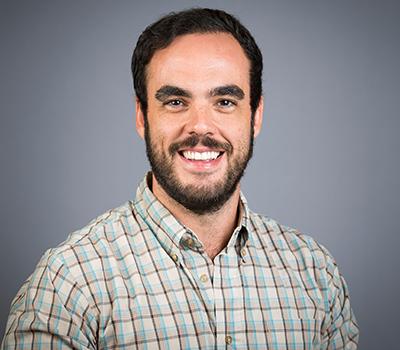
At 7-years-old, when his remote control car quit working, Eduardo Cotilla-Sanchez saw a whole different possibility for it. He realized there was a similarity between the rotating motor and his dad’s electric drill, for which he had a particular fascination. So, with a little scrap sheet metal and some tape he made his own drill.
“I spent the whole afternoon drilling holes in the wall. My mom wasn’t happy about that!” he says.
Although he grew up in a small Mediterranean tourist town in Spain, where breaks from school were spent playing on the warm beach, it was not a permanent vacation there. Education was very important to his parents who worked hard so he and his younger brother and sister could go on to college. He chose a technical track in high school and went on to get his electrical engineering degree in telecommunications.
While getting his undergraduate degree he spent two semesters at the Polytechnic University of Bucharest in Romania which was a transformational experience for him. He had never before been exposed to such a different culture and a huge city before. But even there he was able to find similarities that got him through that challenge. Since Romanian is similar to Spanish he picked up the language pretty easily. “I thought it was fun to know Romanian, although now I mix it up with French. So if I tried to speak it, it would come out as Frenchmanian,” he says with a laugh.
In graduate school, at the University of Vermont, he studied large scale power grids. “I basically moved to higher power and higher voltage,” he says. And his telecommunications background is coming in handy as technology is moving to smart grids where a lot of information is being collected from a variety of power sources, like wind turbines and solar panels, to inform electric grid operators.
What really fascinates him, though, is cascading power outages. “I’m really interested in what happens when you have a bad day, when things go wrong on the grid and it is not looking the same as what you learned during your training,” he says.

With the ultimate goal of preventing catastrophic outages, Cotilla-Sanchez uses mathematical models to better understand all the factors involved, including not just the physical aspects of the power grid but also human decision making and even public policy.
He knew he wanted to become a professor after guest lecturing for his graduate advisor to a class of 120 students from different engineering disciplines such as mechanical and civil engineering. He strove to put the information in terms they would understand, such as drawing an analogy between electric current and water flow. “It was really rewarding because you could see they were excited to understand electrical engineering even though they thought it was something they didn’t like,” he says.
He also sees teaching as a way to have greater influence with his work. “If you are teaching students you are also seeding that inspiration to do something really good. You have a broader impact than doing research in your one field. The students will go in many directions, and hopefully something you taught them will help them have a great idea.”
Although he thinks someday he might like to return to Spain, for now he feels settled in the U.S. He likes the mild climate in Oregon where he can enjoy outdoor sports like hiking, biking and rowing year round. And he was really excited to visit the coast of Oregon.
“It’s different from the Mediterranean — it’s colder! But I really liked it because, even though it was different, just the smell of the ocean and the humidity in the air and the type of food that you get there was reminding me so much of where I grew up. It was really interesting to see how, on the other side of the world, you could recognize those things,” he says.

